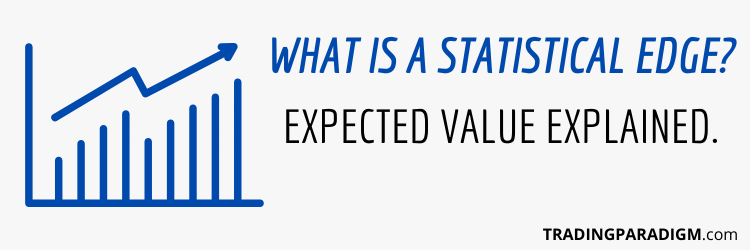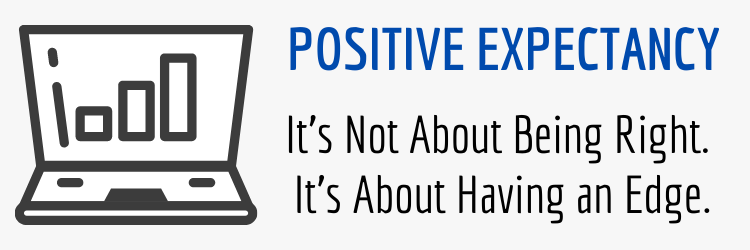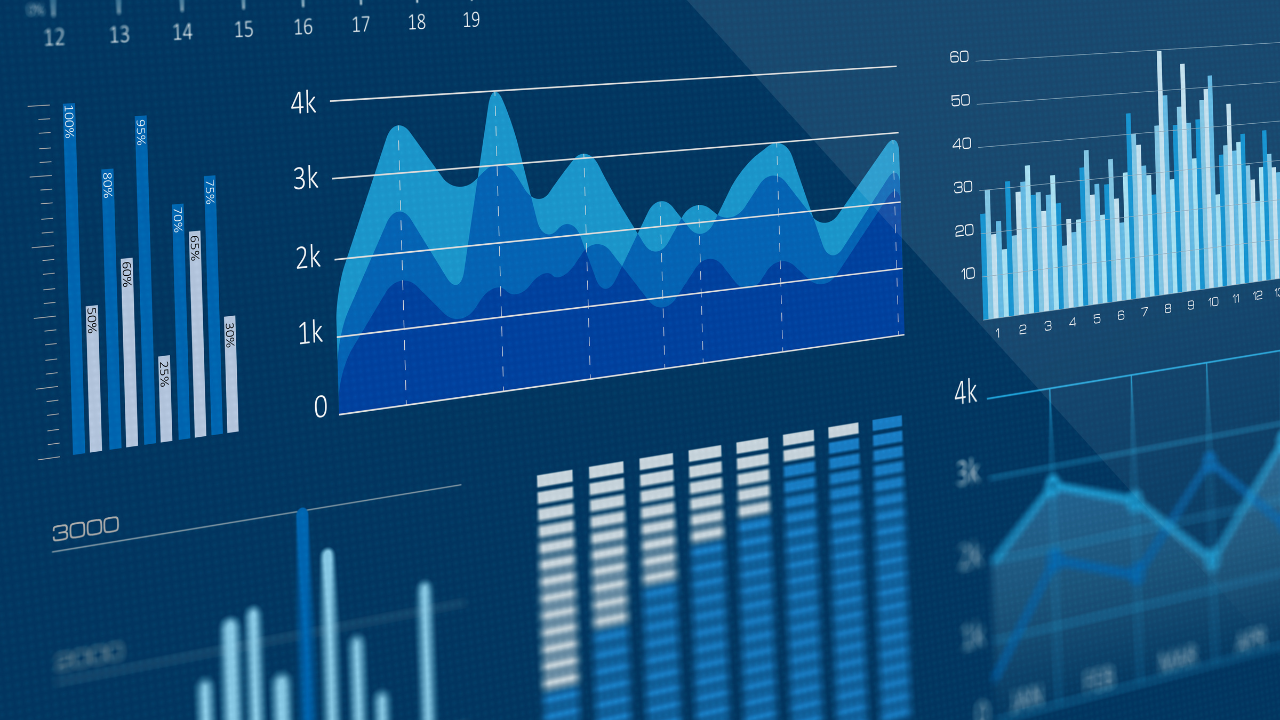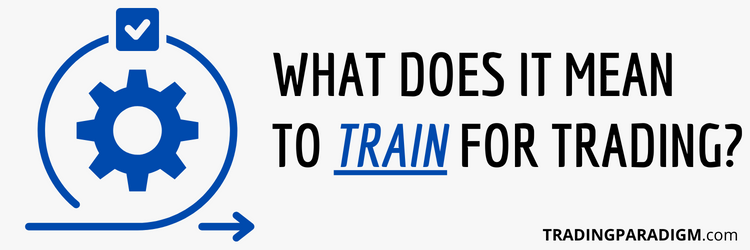A Statistical Edge in Trading is a Strategy or System With Positive Expected Value:
When people try to find or develop a statistical edge for trading stocks, options, futures, forex, cryptocurrencies, or whatever they prefer, they often latch onto win rates – immediately assuming that a 50%+ win rate automatically equates to a winning system.

But what often gets overlooked is the fact that win rate is only part of the equation, and in many cases, doesn’t tell the whole story. Believe it or not, a trader can have a 90% win rate and still have a losing system. So don’t take win rate as the ultimate gauge.
On the flip side of that, a trader can have a 10% win rate or lower and still have a winning system. So there are obviously other critical components to consider. The average sizes of your wins and losses can’t be ignored – they have to be factored in.
All over the internet you’ll find traders boasting about their high win rate systems, even if those high win rates don’t necessarily equate to long-term profitability. I guess the idea of having a 70%, 80%, or even 90% win rate system is more important than making money.
But the truth is that most consistently profitable traders have a win rate somewhere in the 40-60% range. This doesn’t sound exciting to the majority of individuals looking for trading systems, which is how they end up down the ineffective get-rich-quick path.
So you have to be realistic and understand the concept of expected value. Win rate is important, sure, but not the sole ingredient.
The Expected Value Equation With Examples of Winning and Losing Strategies/Systems:
The expected value equation is fairly simple, yet critical for all traders to understand because it measures your expected return on a per trade basis. The four pieces of information needed to calculate it are win rate, loss rate, average win, and average loss.
Expected Value = (Win Rate x Average Win) – (Loss Rate x Average Loss)
If we take a trader with a 90% win rate like I mentioned earlier, we can see how an incredible win rate doesn’t necessarily produce profits. For example, let’s say this trader’s average win is $100 and average loss is $1,000. If we pop these numbers into the expected value equation, this trader can expect to lose ten dollars per trade [EV=(.90 x $100)-(.10 x $1,000)=$90-$100=-$10].
 Now if we flip the script and take a trader with a 10% win rate, average win of $1,000, and average loss of $100 – we can see that it’s possible to be a profitable trader with a seemingly terrible win rate. This trader could actually expect to make $10 per trade on average [EV=(.10 x $1,000)-(.90 x $100)=$100-$90=$10]. Clearly, expected value is what tells the whole story – win rate alone doesn’t.
Now if we flip the script and take a trader with a 10% win rate, average win of $1,000, and average loss of $100 – we can see that it’s possible to be a profitable trader with a seemingly terrible win rate. This trader could actually expect to make $10 per trade on average [EV=(.10 x $1,000)-(.90 x $100)=$100-$90=$10]. Clearly, expected value is what tells the whole story – win rate alone doesn’t.
When boiled down to its simplest form, the concept of trading success is fairly straightforward. All it takes is two main components: 1) a statistical edge/positive expectancy system, and 2) your ability to capitalize on that edge/follow the system. But effectively combining these two components becomes complicated within the dynamic, uncertain, impersonal and limitless market environment.
In my experience, it’s on a psychological level where most traders break down. In other words, it’s not the statistical edge that’s hard to find, but rather the ability to capitalize on that edge with emotional stability and consistency that’s difficult to accomplish.
The Law of Large Numbers – Thinking in Probabilities and Staying Resilient Through Streaks:
One of the most difficult hurdles for new traders to overcome is changing from thinking in certainties to thinking in probabilities.
Naturally, we like to think in certainties because it reduces confusion. Things are either hot or cold, right or wrong, light or dark, good or evil, etc. Thinking this way helps bring clarity to our minds, but it’s destructive within the market environment.
Since the market is inherently uncertain, nothing is guaranteed. So when you go out searching for a system that “works”, understand that “works” doesn’t mean 100% of the time. You have to adopt a probabilistic mindset in order to operate effectively.
With that being said, the law of large numbers essentially states that probabilities will work themselves out over many instances. So even though a coin flip, for example, has 50/50 odds – it doesn’t mean you can’t flip heads 10 times in a row by sheer chance/luck.
This is the sort of thing that derails many new and inexperienced traders. They have their system with a positive expectancy, but give up on it after just a few losing trades in a row. Streaks like this are a perfectly normal occurrence, but hard to overcome mentally.
When things don’t go exactly as expected or desired, the average person will break their rules by removing stop losses or doubling-down on losing positions, get mad at the market and revenge trade, or give up on their system and strategy-hop.
This is just a short list of many impulsive, irrational, and overall destructive trading behaviors. Which is why it’s so important to avoid short-term gratification at the expense of your long-term trading success. Over time, probabilities work themselves out.
Conclusion – Your Statistical Edge and Trading Skills Are Essential For Durable Market Success:
Once you find or develop a statistical edge, don’t assume that the work ends there. Market conditions can always change and render your current system ineffective. This is a mistake that many new traders make – failing to adequately adapt to the market.
There is no system that performs exactly the same in every type of market – down-trending, up-trending, sideways, volatile, nonvolatile, etc. So you also have to understand how your statistical edge fluctuates depending on current market conditions.
This is where closely tracking your trades and analyzing the data can help you pinpoint when your system is performing at its best and possibly even avoid trading the system at certain times. You might also be able to refine your stop losses and profit targets.
These are the intricate details of trading success that most fake trading gurus on the internet tend to ignore because they want you to think that trading is easy – and that they have some “foolproof indicator” that generates nothing but profits.
But the reality is that simple patterns aren’t the answer. It takes a combination of core trading skills to be successful. It’s not depending on some self-proclaimed expert to tell you what to buy or sell. It’s building technical, analytical, and mental skills for self-sufficiency.
In the end, a statistical edge is required for consistent success, but that edge will undoubtedly be compromised without proper skills.
Learn More in the Trading Success Framework Course
Written by Matt Thomas (@MattThomasTP)
Related Pages:
- 3 Core Components of a Robust Market Methodology
- Best Futures Trading Indicators – The Top 2 on My Charts
- Molding Your Market Framework – How Do You View Markets?
- Day Trading Volume Profile – Does Volume Profile Work?
- What is Trading Expectancy? The Importance of Having a Statistical Edge





How do you deem what is a good EV vs an average EV?
I agree that short-term gratification should not come at the expense of long-term trading success. Probabilities, as you mentioned, work themselves out over time. I really like how you mentioned that a statistical edge in trading requires a combination of essential trading abilities to be successful, as well as the development of technical, analytical, and mental skills for self-sufficiency.
Hi Lio – thanks for taking the time to comment!
I think there’s a common misconception that trading is just gambling and/or depends entirely on luck. But in the vast majority of cases (especially over the long term), luck has nothing to do with it. Durable trading success is just a matter of probabilities playing out in your favor over time. There’s a major difference between getting lucky and “winning big” on a couple trades, and consistently pulling profits out of the market over the course of years. There are certainly some people that do get lucky and “hit big” by sheer chance or luck, but most of the time these individuals end up giving their winnings right back.
It’s kind of sad to talk about, but it’s similar to how things work with lottery winners. There’s absolutely no skill involved with playing the lottery. You simply buy some tickets and hope for the best – and the odds aren’t in your favor at all (typically millions to one). I believe I read somewhere that you’re statistically more likely to get struck by lightning or to get hit by an asteroid than win the lottery. But by sheer luck, somebody is going to win the jackpot. The unfortunate reality is that around 70% of large lottery winners end up going bankrupt within a few years. This is because they lack the knowledge and skills to build and grow wealth for themselves. A large windfall will disappear just as quick as it arrives if you don’t know how to manage it.
This same exact concept applies to market participants. Lottery ticket purchases noticeably increase during times when the economy is bad – and sales are usually higher amongst low education and low income individuals. So it’s usually those looking for a quick payday that opt to buy lottery tickets or jump headfirst into the markets – which is completely understandable. When you’re in a tough spot of course you want the easiest and fastest path out of your current situation. But the approach of jumping into the markets completely unprepared simply doesn’t work. Entering with that kind of desperation to make money is an absolute recipe for disaster. In the end, it takes the acquisition and development of legitimate skills in order to achieve long-term trading success. As I heard somebody once say: trading is the hardest “easy” money you’ll ever make.
My knowledge when it comes to trading isn’t very good at the moment. This article and site in general helps me better understand something I’ve always had an interest in, but could never wrap my head around the complexities involved. What you do here is break it down where it’s easier to understand. This helps when someone wants to get involved with trading, but lacks the confidence and knowledge needed in order to make it a successful venture.
I appreciate the kind words, Millie! I’m glad this particular article, along with others on my site, have helped you. Trading (good, consistent trading that is) isn’t often what people initially think. There’s usually an assumption that trading is reckless and flat-out gambling, but it’s actually about putting the odds in your favor with a statistical edge, controlling risk, thinking long-term, and managing emotions. Unfortunately, most individuals (including myself at the beginning) approach trading in a completely wrong way (impulsively and irrationally), but I know now that it requires a unique market and mental framework in order to succeed.
This is a great website for someone who knows nothing about trading. I learned so much through this article alone and feel it is so true the importance of being able to adapt and the strategy that we currently have can eventually be outdated and stop working. This concept of having a statistical edge is something not many people think about, including me some times. Most people in the market seem to just gamble and trade randomly.
Hi Shrey – I appreciate your comment! I’m glad you found this article helpful. You’re exactly right that most people enter the market without any concrete plan and end up trading based off gut feelings or impulses – and that’s just not a proper strategy. Not having a statistical edge and/or not being able to execute on that statistical edge (usually for psychological reasons) are the two main reasons over 90% of traders fail. If you don’t understand the expected value of your strategy/system (your edge), then it becomes very difficult to follow it with consistency and discipline. Having an edge and being able to capitalize on it is what separates good traders from bad traders/gamblers. There’s still risk and uncertainty, of course, but it’s not really gambling when the odds are in your favor.